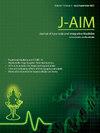在百草枯诱导的大鼠帕金森病模型中,白桦的神经保护潜力通过调节神经炎性细胞因子改善帕金森病的活性
IF 1.9
Q3 INTEGRATIVE & COMPLEMENTARY MEDICINE
引用次数: 0
摘要
帕金森病(PD)是一种普遍的与年龄相关的神经退行性疾病,其逐渐发展,约占老年人口的1%。最近,人们对植物成分治疗帕金森病的可能性越来越好奇,因为它们含有丰富的活性化合物,特别是抗氧化剂和抗炎剂。目的:我们的目的是评估具有抗氧化特性的东贝亚(Dombeya wallichii)乙醇提取物对帕金森大鼠模型的影响。材料与方法大鼠接受10 mg/kg百草枯治疗,观察其抗帕金森病作用。百草枯处理后1 h,分别用200、400、600 mg/kg的白桦醇提物处理21 d。献祭前对行为方面进行评估。第22天,对大鼠实施安乐死,检测其体内抗氧化酶(超氧化物歧化酶、谷胱甘肽、丙二醛、过氧化氢酶)、神经递质(多巴胺、去甲肾上腺素、血清素、乙酰胆碱酯酶)、mRNA表达和神经炎性细胞因子(白细胞介素-1β、肿瘤坏死因子-α、核因子κ B、白细胞介素-6)的变化。结果白桦醇提物对百草枯致大鼠旋转、孔板、运动障碍、前肢悬吊等运动障碍有明显的减轻作用。它还通过降低氧化应激和炎症细胞因子来改善生化和神经炎症标志物,显示出抗氧化和抗炎活性。q-RT-PCR结果显示,白介素-1β、核因子κ B和肿瘤坏死因子-α下调,mRNA表达具有神经保护作用。结论该植物具有抗氧化和抗炎作用,可能是治疗帕金森病的可行候选药物。本文章由计算机程序翻译,如有差异,请以英文原文为准。
Neuroprotective potential of dombeya wallichii ameliorates Parkinson's activity in paraquat-induced Rat's model via modulation of neuro-inflammatory cytokines
Background
Parkinson's disease (PD) is a prevalent age-related neurodegenerative condition that develops gradually and is observed in around 1 % of the elderly population. Lately, there has been an increasing curiosity about the possibilities of phyto-components for the treatment of PD due to their rich array of active compounds, notably antioxidants and anti-inflammatory agents.
Objective
Our objective was to assess the impact of an ethanolic extract from Dombeya wallichii, which has antioxidant properties, on the Parkinsonian rat's model.
Material and methods
Rats received 10 mg/kg paraquat to assess its antiparkinsonian effects. They were treated with ethanolic extract of Dombeya wallichii (200, 400, 600 mg/kg) for 21 days, 1 h after paraquat. Behavioral aspects were evaluated before sacrifice. On day 22, rats were euthanized, and their bodies examined for changes in antioxidant enzymes (superoxide dismutase, glutathione, malondialdehyde, catalase), neurotransmitter levels (dopamine, noradrenaline, serotonin, acetylcholinesterase), mRNA expression and neuroinflammatory cytokines (Interleukin-1β, Tumor Necrosis Factor-α, nuclear factor kappa B, Interleukin-6).
Results
The ethanolic extract of Dombeya wallichii reduced paraquat-induced motor deficits in the rotarod, hole board, akinesia, and forelimb hanging tests. It also improved biochemical and neuroinflammatory markers by lowering oxidative stress and inflammatory cytokines, showing antioxidant and anti-inflammatory activities. q-RT-PCR revealed that D. wallichii downregulated α-synuclein, Interleukin-1β, nuclear factor kappa B, and Tumor Necrosis Factor-α, while mRNA expression indicated neuroprotection.
Conclusion
These findings suggest that Dombeya wallichii could be a viable candidate for Parkinson's disease treatment, owing to its antioxidant and anti-inflammatory properties.
求助全文
通过发布文献求助,成功后即可免费获取论文全文。
去求助
来源期刊

Journal of Ayurveda and Integrative Medicine
INTEGRATIVE & COMPLEMENTARY MEDICINE-
CiteScore
4.70
自引率
12.50%
发文量
136
审稿时长
30 weeks
 求助内容:
求助内容: 应助结果提醒方式:
应助结果提醒方式:


